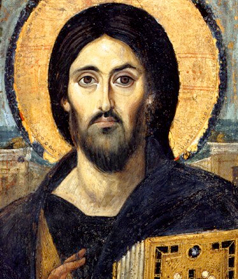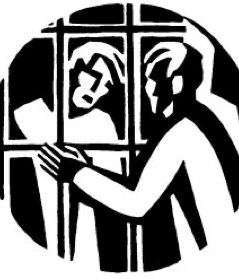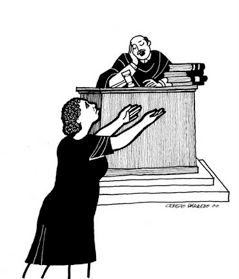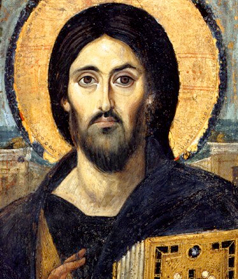|
Works of Mercy and Justice, Love and Compassion
The Mediterranean world of Jesus’ time was built upon layers and layers of social and economic relationships, with each layer exerting some form of dominance over the layers below it. From emperor to slave, power was exerted over and upon those farther down the ladder. One of the most striking things about Jesus is how he did things that went against this system of power and domination. Everywhere Jesus went, his preaching and the things he did were received and experienced as “good news.” He healed the sick, brought sight to the blind, cast out demons, caused the lame and crippled to walk, cured leprosy, and taught the common people ways to live under an oppressive political and economic system that restored their dignity without resorting to violence. He respected their dignity as persons and worked to re-instill that sense of dignity in those who the rest of the world had counted as expendable and worthless. |
The Spiritual Disciplines of Jesus |
Jesus didn’t simply “put a band-aid” on people’s problems, but he also addressed the social conditions that prevented people from being whole or healthy, or that favored one group at the expense of another. He also addressed ways of thinking and belief systems that did not have the well-being of persons as their ultimate goal or guiding principle. Several times he was criticized for healing on the Sabbath, and he replied with “The Sabbath was made for man, not man for the Sabbath.” If it was lawful to pull an ox out of a well on the Sabbath, was it not lawful to heal a person who had been in bondage to disease for several years?
We will look at this in closer detail in a later chapter. But it is important at this juncture to point out that his reaching out to social outcasts, the unclean, beggars, women and foreigners was not a series of quirks of behavior or accidents in life. They were conscious, deliberate acts that reflected the set of his mind. They were acts so significant that the early Christian community made sure to remember them and later to preserve them in the words of Scripture.
The basic principle Jesus operated from was the well-being and wholeness of every person. The spiritual practice that arises from this has to do with engaging in whatever set of actions that maximizes the well-being of persons in their wholeness as persons. This may involve addressing social inequities, laws that discriminate or favor only a select few. It may involve advocating on behalf of marginalized or disempowered persons. It may involve being a supportive companion for a person whose self-esteem has been dashed, and helping them piece it together again. There is no shortage of places in the world in which acts of justice, mercy, love and compassion are needed.
The extension of mercy to those in troubled places and the work for justice for those experiencing oppression and injustice in whatever form it presents itself is a profound spiritual discipline that reflects the mind of Christ at work in us.
Works of Love and Compassion
Similarly, much of Jesus’ ministry was involved in works of healing and restoration of persons to wholeness of mind, body and spirit. Over and over, the compassion of Jesus is highlighted in the Gospels, and serves as the wellspring from which his actions and behavior originated. In the way of life that Jesus lived and taught, love was not a warm, mushy feeling but rather a bold way of acting. If a person was broken in body, then he worked a physical healing. If a person was broken is spirit, then he worked to raise their self-appraisal and let them know their value in the sight of God. No one was outside the sphere of Jesus’ kindness and help. What Jesus could do to help, he did. The only time he was unable to help someone was when they did not receive him or believe in what he offered to them.
We will look at this in closer detail in a later chapter. But it is important at this juncture to point out that his reaching out to social outcasts, the unclean, beggars, women and foreigners was not a series of quirks of behavior or accidents in life. They were conscious, deliberate acts that reflected the set of his mind. They were acts so significant that the early Christian community made sure to remember them and later to preserve them in the words of Scripture.
The basic principle Jesus operated from was the well-being and wholeness of every person. The spiritual practice that arises from this has to do with engaging in whatever set of actions that maximizes the well-being of persons in their wholeness as persons. This may involve addressing social inequities, laws that discriminate or favor only a select few. It may involve advocating on behalf of marginalized or disempowered persons. It may involve being a supportive companion for a person whose self-esteem has been dashed, and helping them piece it together again. There is no shortage of places in the world in which acts of justice, mercy, love and compassion are needed.
The extension of mercy to those in troubled places and the work for justice for those experiencing oppression and injustice in whatever form it presents itself is a profound spiritual discipline that reflects the mind of Christ at work in us.
Works of Love and Compassion
Similarly, much of Jesus’ ministry was involved in works of healing and restoration of persons to wholeness of mind, body and spirit. Over and over, the compassion of Jesus is highlighted in the Gospels, and serves as the wellspring from which his actions and behavior originated. In the way of life that Jesus lived and taught, love was not a warm, mushy feeling but rather a bold way of acting. If a person was broken in body, then he worked a physical healing. If a person was broken is spirit, then he worked to raise their self-appraisal and let them know their value in the sight of God. No one was outside the sphere of Jesus’ kindness and help. What Jesus could do to help, he did. The only time he was unable to help someone was when they did not receive him or believe in what he offered to them.
|
|
In this video, Craig S. Pesti-Strobel looks closely at how mercy and justice, love and compassion arise out of the character of God. A basic working definition of justice is given, and he explores not only how Jesus operated according to it, but also how we are called to work for justice if we walk the Path of Jesus in the 21st Century. |
Via Vida Session 41: JP21 Way of Ways: Works of Mercy & Justice, Love & Compassion.
Session Outline:
- Regather, greet
- Practice Centering Prayer
- Scripture Study: Deuteronomy 10:12-21 and Matthew 12:15-21; 23:23-24.
- What image or phrases caught your attention?
- What was most puzzling?
- What would you like to learn more about?
- What really spoke to your heart?
- View video for Session 41.
- Read “The Way of Works of Mercy and Justice, Love and Compassion” and discuss using the discussion questions provided.
- Close in prayer.
Next Practice: Acts of Forgiveness and Reconciliation.
Click on the images below to read about JP21-BiggerMind; JP21-Bigger Heart; JP21-Bigger World; JP21-Bigger Life; JP21-Way of Ways.
Click on the images below to read about JP21-BiggerMind; JP21-Bigger Heart; JP21-Bigger World; JP21-Bigger Life; JP21-Way of Ways.
Proudly powered by Weebly










